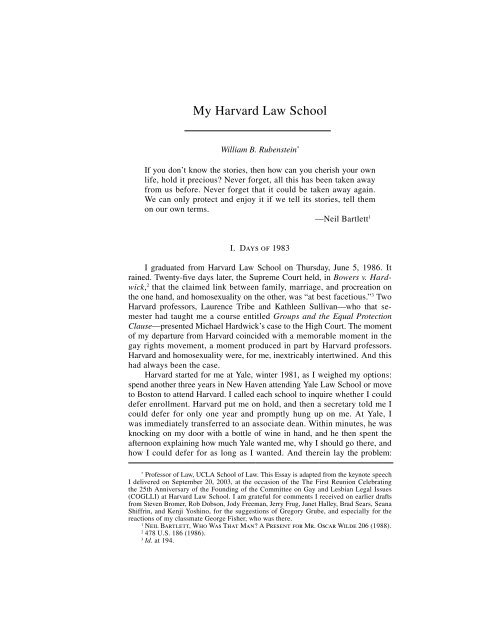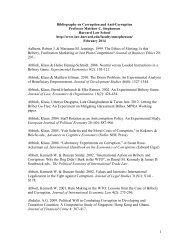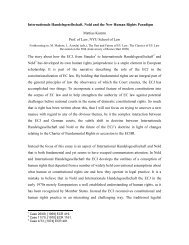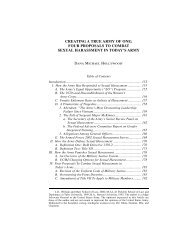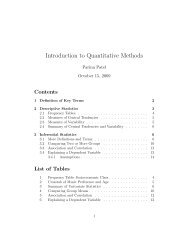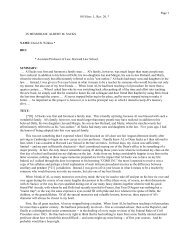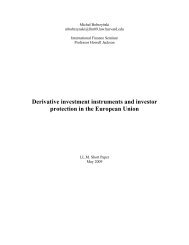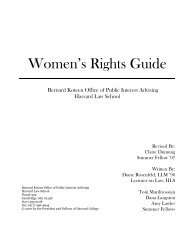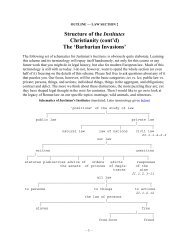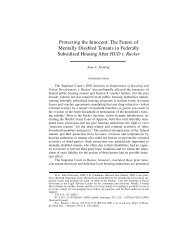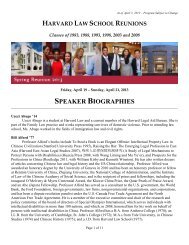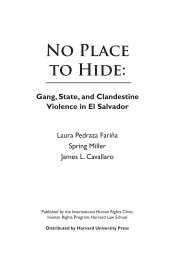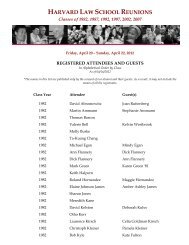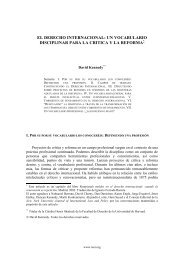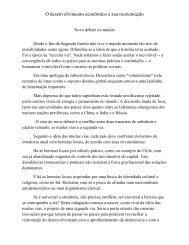My Harvard Law School
My Harvard Law School
My Harvard Law School
Create successful ePaper yourself
Turn your PDF publications into a flip-book with our unique Google optimized e-Paper software.
<strong>My</strong> <strong>Harvard</strong> <strong>Law</strong> <strong>School</strong><br />
William B. Rubenstein *<br />
If you don’t know the stories, then how can you cherish your own<br />
life, hold it precious? Never forget, all this has been taken away<br />
from us before. Never forget that it could be taken away again.<br />
We can only protect and enjoy it if we tell its stories, tell them<br />
on our own terms.<br />
—Neil Bartlett 1<br />
I. Days of 1983<br />
I graduated from <strong>Harvard</strong> <strong>Law</strong> <strong>School</strong> on Thursday, June 5, 1986. It<br />
rained. Twenty-ªve days later, the Supreme Court held, in Bowers v. Hardwick,<br />
2 that the claimed link between family, marriage, and procreation on<br />
the one hand, and homosexuality on the other, was “at best facetious.” 3 Two<br />
<strong>Harvard</strong> professors, Laurence Tribe and Kathleen Sullivan—who that semester<br />
had taught me a course entitled Groups and the Equal Protection<br />
Clause—presented Michael Hardwick’s case to the High Court. The moment<br />
of my departure from <strong>Harvard</strong> coincided with a memorable moment in the<br />
gay rights movement, a moment produced in part by <strong>Harvard</strong> professors.<br />
<strong>Harvard</strong> and homosexuality were, for me, inextricably intertwined. And this<br />
had always been the case.<br />
<strong>Harvard</strong> started for me at Yale, winter 1981, as I weighed my options:<br />
spend another three years in New Haven attending Yale <strong>Law</strong> <strong>School</strong> or move<br />
to Boston to attend <strong>Harvard</strong>. I called each school to inquire whether I could<br />
defer enrollment. <strong>Harvard</strong> put me on hold, and then a secretary told me I<br />
could defer for only one year and promptly hung up on me. At Yale, I<br />
was immediately transferred to an associate dean. Within minutes, he was<br />
knocking on my door with a bottle of wine in hand, and he then spent the<br />
afternoon explaining how much Yale wanted me, why I should go there, and<br />
how I could defer for as long as I wanted. And therein lay the problem:<br />
* Professor of <strong>Law</strong>, UCLA <strong>School</strong> of <strong>Law</strong>. This Essay is adapted from the keynote speech<br />
I delivered on September 20, 2003, at the occasion of the The First Reunion Celebrating<br />
the 25th Anniversary of the Founding of the Committee on Gay and Lesbian Legal Issues<br />
(COGLLI) at <strong>Harvard</strong> <strong>Law</strong> <strong>School</strong>. I am grateful for comments I received on earlier drafts<br />
from Steven Bromer, Rob Dobson, Jody Freeman, Jerry Frug, Janet Halley, Brad Sears, Seana<br />
Shiffrin, and Kenji Yoshino, for the suggestions of Gregory Grube, and especially for the<br />
reactions of my classmate George Fisher, who was there.<br />
1 Neil Bartlett, Who Was That Man? A Present for Mr. Oscar Wilde 206 (1988).<br />
2 478 U.S. 186 (1986).<br />
3 Id. at 194.
318 <strong>Harvard</strong> Civil Rights-Civil Liberties <strong>Law</strong> Review [Vol. 39<br />
New Haven was a small town. For a young person struggling to come out, it<br />
was perilous. I feared that the tenderest tiptoe out of the closet would, within<br />
moments, produce a law school dean at my door. I chose <strong>Harvard</strong> so I could<br />
come out, or, more precisely, I chose <strong>Harvard</strong> because it was in Boston, a<br />
large anonymous city that enabled me to come out at my own pace. I looked<br />
forward to the education, but <strong>Harvard</strong> promised something Yale could not:<br />
not just law, but sex and reason, ºesh and the word, beauty and truth.<br />
About the time that the Yale Dean was traipsing across New Haven to<br />
meet me, a new virus was on a collision course with my desires. The Centers<br />
for Disease Control (CDC) had just published its ªrst studies showing a<br />
link between “some aspect of homosexual lifestyle . . . and pneumocystis<br />
pneumonia,” 4 and reporting that twenty-six gay men in New York and California<br />
had been diagnosed with Kaposi’s Sarcoma, all strikingly young and<br />
healthy, each dead within two years. 5 By the time I took my seat in Arthur<br />
Miller’s Civil Procedure class my ªrst day of law school, about 2000 AIDS<br />
cases had been reported to the CDC, so exclusively among gay men that the<br />
disease was referred to as Gay-Related Immune Deªciency (GRID). While<br />
scientists suspected a virus caused GRID, none had been identiªed and no<br />
test existed to determine one’s vulnerability. Human Immunodeªciency Virus<br />
(HIV) was not identiªed until my 2l year, and a test was not widely<br />
available until my 3l year. During my law school years, young sexually<br />
active gay men were at risk of dying quick and horrible deaths from a new<br />
disease that bore our name, yet we had no way of knowing whether we, our<br />
sexual partners, and our friends were infected, whether we would die. I came<br />
to <strong>Harvard</strong> to acquire knowledge, but the one fact I wanted to know more<br />
than any other neither <strong>Harvard</strong> nor any other institution could provide.<br />
There were other gaps in <strong>Harvard</strong>’s provision of an education. One of<br />
my earliest law school memories is of an evening during my ªrst semester<br />
spent exercising my newly acquired legal research skills in an attempt<br />
to uncover cases about gay people. I had been taught, in those protocomputerized<br />
days, that traditional research tools would lead me to the<br />
cases I wanted to ªnd and I had been given, by my instructor, a checklist<br />
of such helpful resources. But as I worked my way down the checklist, I<br />
could ªnd no mention of homosexuality, much less of lesbians and gay<br />
men. Up and down the cavernous corridors and through the labyrinth of<br />
stacks I went—no casebooks, no hornbooks, no treatises, no black letter<br />
guides, no practice pointers. As each possibility was exhausted, I increasingly<br />
felt trapped in an Orwellian nightmare. In the vast majestic expanses of<br />
<strong>Harvard</strong> <strong>Law</strong> <strong>School</strong>’s library—where no subject was too obscure for its<br />
own shelf—the absence of legal materials about my life was deafening.<br />
4 Centers for Disease Control and Prevention, Pneumocystis Pneumonia—Los Angeles,<br />
Morbidity & Mortality Wkly. Rep., June 5, 1981, at 250–52.<br />
5 Centers for Disease Control and Prevention, Kaposi’s Sarcoma and Pneumocystis<br />
Pneumonia Among Homosexual Men—New York City and California, Morbidity & Mortality<br />
Wkly. Rep., July 3, 1981, at 305–08.
2004] <strong>My</strong> <strong>Harvard</strong> <strong>Law</strong> <strong>School</strong> 319<br />
In the succeeding semesters, I pieced together a self-education, relying<br />
primarily on the few law review articles then published on the subject; on<br />
a dog-eared and defaced ªrst edition of the ACLU’s handbook, The Rights of<br />
Gay People; 6 and on the early years of Arthur Leonard’s Lesbian/Gay <strong>Law</strong><br />
Notes. There were rare classroom moments—the inclusion of gay families<br />
in Martha Minow’s family law course, the coverage of homosexuals<br />
in Kathleen Sullivan’s advanced constitutional law course, an undergraduate<br />
literature seminar on post-modernism, including post-modern sexualities,<br />
which I audited with my contracts professor, Jerry Frug. But for these moments,<br />
I would have been a complete gay-law autodidact.<br />
The informal education I got outside of <strong>Harvard</strong>’s classrooms far outstripped<br />
the formal education I received in them. Some of it took place at<br />
COGLLI meetings, especially because the class one year ahead of mine<br />
included a group of remarkable activists—Ben Schatz, Chai Feldblum, Paul<br />
DiDonato, Michael Isbell, Luis Lavin—all of whom have remained so for<br />
decades. Some of my informal education took place in a basement room<br />
called the <strong>Harvard</strong> Women’s <strong>Law</strong> Journal, better known at the time as the<br />
<strong>Harvard</strong> Women’s and Gay Men’s <strong>Law</strong> Journal. I devoured past issues<br />
packed full of feminism, including lesbian feminism. I stumbled upon a<br />
set of binders constituting a reader for a course that Catharine MacKinnon<br />
had taught at Stanford <strong>Law</strong> <strong>School</strong> called Sexuality and Legality. The reader<br />
had whole sections on homosexuality, even on transsexuality. I sat in the<br />
shabby ofªce on a sunken couch drinking coffee and reading through the<br />
books from cover to cover, awed by what was there but not here. Our 3l<br />
year, my friend Ruth Borenstein crowned me with the title of Managing<br />
Editor. When I went on the teaching market some years later, my résumé<br />
was turned into a computer form which spat back out an abbreviation announcing<br />
that I had been the “Man Editor” of the Women’s <strong>Law</strong> Journal. I<br />
wanted only to object that I was the “Gay Man Editor,” clinging closely to<br />
what was then my newfound identity.<br />
<strong>My</strong> informal education occasionally even took place in the classroom.<br />
Once, I looked across hundreds of students packed into Austin Hall and<br />
saw one, head down, sound asleep. I tapped my friend Luis Lavin and said,<br />
“Look at that guy sleeping over there,” to which he responded without<br />
missing a beat, “Oh, that’s Ric. She clearly stayed out too late last night<br />
and now she’s smudging her makeup.” It may not have been the ªrst time<br />
someone made a campy comment during Abe Chayes’s international law<br />
class, but it felt that way to me, history in the making. <strong>My</strong> then-campy<br />
friend is now a judge; our sleeping friend Ric Chanon, our sleeping beauty,<br />
died of AIDS within ªve years, February 1990, barely thirty. One year<br />
during law school, Ben Schatz had a party to watch the Academy Awards<br />
and as his guests arrived, Ben crowned each with a tiara. I like to think of<br />
6 E. Carrington Boggan et al., The Rights of Gay People: The Basic ACLU<br />
Guide to a Gay Person’s Rights (1975).
320 <strong>Harvard</strong> Civil Rights-Civil Liberties <strong>Law</strong> Review [Vol. 39<br />
Ric in his tiara, crowned not temporarily, queen for a day, as Ben had intended,<br />
but crowned with those jewels eternally, as each of us deserves to<br />
be. What had he done, after all, but go down into the salt tide of wanting<br />
as much as he wanted? 7<br />
No one should have to die for wanting too much.<br />
No one should have to die for wanting.<br />
No one should have to die.<br />
No one.<br />
<strong>My</strong> learning took place beyond the walls of <strong>Harvard</strong> as well: in the<br />
coffeehouses of <strong>Harvard</strong> Square; in tiny South End apartments; in openly<br />
gay Vin McCarthy’s 1985 Congressional campaign; at pride parades and<br />
demonstrations, one my 2l year protesting Governor Dukakis’s removal<br />
of two children from their gay foster parents; and in Provincetown, on the<br />
edge of the continent, where, in 1984, the summer after my 1l year, riding<br />
my bike one June afternoon, I stopped to talk to a beautiful blond man sitting<br />
in front of Body Body on Commercial Street, thinking he could be the loveof-my-life,<br />
and because I was too forward, he said, “I like to be wined and<br />
dined ªrst,” and now, twenty years and twenty twists later, the two of us<br />
live together on the other edge of the continent, in a house on a hill, with<br />
a dog, in a relationship blessed by the State of California.<br />
But I get ahead of myself. Most of my learning at <strong>Harvard</strong> took place,<br />
of course, in bars around the city. One, on Cambridge Street, where upstairs<br />
in a nearly empty room over a crowded bar, a beautiful black drag<br />
queen—perched on the edge of the piano, under a blue spot, her legs<br />
crossed in front of her so that the straps of her sparkling ankle shoes<br />
glimmered—sang only to us. 8 One, The 1270, where we crowded out on<br />
the rooftop on hot summer nights, backlit by the glow of the lights from<br />
Fenway Park, and where one night, March 17, 1984, I met the ªrst loveof-my-life,<br />
an artist who could talk about Gary Hart’s presidential campaign.<br />
I called him several times even though he never called me back once.<br />
I might call him again to apologize for my naive persistence, my lack of<br />
etiquette, my ignorance of the austere code of tricks. I didn’t know how to<br />
make love like that. I thought of course we’d go on learning the ªt of<br />
chest to chest, curve to curve. 9 Another night, leaving The 1270, I stopped to<br />
talk to a man sitting at the bar by the door because he smiled at me, and<br />
he really did become the first love-of-my-life, a blond who played the cello<br />
like an angel, Haydn concertos wafting through cold Cambridge apartments<br />
while I read the law. And finally one bar called Buddies, smack in<br />
7 Mark Doty, Tiara, in Turtle, Swan & Bethlehem in Broad Daylight: Two<br />
Volumes of Poetry by Mark Doty 96 (2001) [hereinafter Turtle, Swan].<br />
8 Mark Doty, Chanteuse, in <strong>My</strong> Alexandria: Poems by Mark Doty 24, 26 (1993)<br />
[hereinafter <strong>My</strong> Alexandria].<br />
9 Mark Doty, Days of 1981, in <strong>My</strong> Alexandria, supra note 8, at 10.
2004] <strong>My</strong> <strong>Harvard</strong> <strong>Law</strong> <strong>School</strong> 321<br />
the middle of the Back Bay. They made you stand in line along Boylston<br />
Street to get into Buddies, a line so publicly visible that on bustling Saturday<br />
nights it tested my determination to come out. But as the years progressed,<br />
I stood proud, eventually marching up to that line in the ªrm<br />
center of my authority, head up like a missionary moving certainly into<br />
the country of his hopes, 10 which is all that Buddies represented to me.<br />
Could you even name it, that longing? 11 One 1l Saturday night, gliding<br />
across the dance ºoor to a song called, “It’s Raining Men,” I bumped into<br />
someone from my class, one of the men it was raining, and, as the DJ<br />
segued and the ªrst notes of Sylvester feeling “Mighty Real” sounded<br />
forth, we greeted one another as if we were passing in the bowels of Langdell<br />
Hall, though to a different soundtrack, and I did, at that moment, feel<br />
mighty real. <strong>My</strong> 3l year, Buddies burned down, if you can call a ªre in a<br />
basement bar “burning down,” and some years later a queen wrote an article<br />
in the local gay paper saying that if you were gay in Boston in 1985, you’ll<br />
always remember where you were at the moment you heard that Buddies<br />
burned, like our parents used to tell us about Kennedy’s assassination. I<br />
confess I know precisely where I was when the news reached me: dancing<br />
with my friend Paul Butler to Prince’s “Let’s Go Crazy” (Electric word,<br />
life) at the Haymarket Bar in the Combat Zone; when we heard the news,<br />
Paul and I jumped in a car and sped uptown through the dawn-empty city 12<br />
to bear witness; to what, God only knows—to the end of an era?<br />
<strong>Harvard</strong> ended for me at Yale. In the spring of our 3l year, my friends<br />
and I traveled down to New Haven for America’s ªrst AIDS law conference.<br />
Afterwards, we danced in New Haven’s one gay bar and I bumped<br />
right into an associate dean of the law school. We hugged, I laughed, I was,<br />
ofªcially, out.<br />
The lesson: I didn’t just come out at <strong>Harvard</strong>, I learned how to be gay at<br />
<strong>Harvard</strong>. The historian David Halperin has written: “Just because you happen<br />
to be a gay [person] doesn’t mean that you don’t have to learn how to<br />
become one.” 13 I learned to be gay at <strong>Harvard</strong> because I didn’t, or couldn’t,<br />
learn how to be gay growing up in Pittsburgh, Pennsylvania, in the 1960s.<br />
That sentence implies something speciªc to that time or place, but I mean<br />
to be universal: most everyone who will someday recognize, acknowledge,<br />
and perhaps respond to homosexual desire will have been raised by nongay<br />
parents, in a non-gay family, among non-gay people. We live our youths<br />
in alien, and often quite threatening, territory, 14 isolated outcasts dreaming<br />
10 Mark Doty, Turtle, Swan, in Turtle, Swan, supra note 7, at 15, 16.<br />
11 Mark Doty, Manhattan: Luminism, in Source 16, 19 (2001).<br />
12 Audre Lorde, Tar Beach, in Home Girls: A Black Feminist Anthology 145<br />
(Barbara Smith ed., 1983).<br />
13 David M. Halperin, Course Syllabus, How To Be Gay: Male Homosexuality and Initiation,<br />
English 317.002, Univ. of Mich. (Fall 2003) (on ªle with author).<br />
14 As Eve Sedgwick explains:
322 <strong>Harvard</strong> Civil Rights-Civil Liberties <strong>Law</strong> Review [Vol. 39<br />
of escape to San Francisco, or to the nearest big city. But ours is a uniquely<br />
tragic diaspora: even as one generation makes it home, the next is invariably<br />
born dispersed, doomed to repeat the hejira, the pattern of solitary<br />
self-discovery and frenzied ºight so unremitting as to be worthy of<br />
Sisyphus. Our young people will, therefore, again and again and again, wash<br />
up orphans on <strong>Harvard</strong>’s shores, in search not only of love, but of self-worth,<br />
guidance, and acceptance, of, in short, a home.<br />
In this sense, it might be most accurate to say of my student experience<br />
at <strong>Harvard</strong> that, as Neil Bartlett has written, “I didn’t so much ‘come<br />
out’ as ‘go in’” 15 —go in, in this case, to a rich, wonderful, and quite vibrant<br />
community. It is paradoxical that at the moment we ªnally work up the<br />
courage to declare our own individuality, we simultaneously, and hesitantly,<br />
associate ourselves with an existing group of peoples, institutions, and<br />
histories. We do so hesitantly because there’s risk involved: communities<br />
can be stiºing, demand conformity, just like our families.<br />
And hence the terms of life: this conºict; this constant indecipherable<br />
act, balancing the hunger for connection with the yearning for selfhood;<br />
this endless battle between alienation and acquiescence, loneliness<br />
and conventionality; this high-wire trick, seeking perfect stasis poised<br />
over the realms of desire: 16 coming out (“If I am not for myself, who will<br />
be for me?”) versus going in (“If I am only for myself, what am I?”). As<br />
I came out of <strong>Harvard</strong>, I went in to the life.<br />
II. Days of 1993<br />
After graduating, I started doing legal work on AIDS issues because<br />
my friends were dying and I assumed I would too. While clerking for a<br />
federal judge in Washington, I volunteered to be a “buddy” for people with<br />
AIDS. I was so clumsy at the buddy training that one of the trainers said,<br />
“Forget it, Mary, she’ll be dead by the time you change that pillowcase,”<br />
and I was assigned to work on wills with the organization’s one lawyer.<br />
During the day, he and a group of volunteers interviewed men, scores of<br />
them, about their dying wishes. After work, I would pick up the ªles, return<br />
[T]he number of persons or institutions by whom the existence of gay people is<br />
treated as a precious desideratum, a needed condition of life, is small. The presiding<br />
asymmetry of value assignment between hetero and homo goes unchallenged everywhere:<br />
advice on how to help your kids turn out gay, not to mention your students,<br />
your parishioners, your therapy clients, or your military subordinates, is less ubiquitous<br />
than you might think. On the other hand, the scope of institutions whose programmatic<br />
undertaking is to prevent the development of gay people is unimaginably<br />
large.<br />
Eve Kosofsky Sedgwick, How To Bring Your Kids Up Gay: The War on Effeminate Boys, in<br />
Tendencies 154, 161 (1993).<br />
15 Bartlett, supra note 1, at 223.<br />
16 Doty, Tiara, in Turtle, Swan, supra note 7, at 96, 97.
2004] <strong>My</strong> <strong>Harvard</strong> <strong>Law</strong> <strong>School</strong> 323<br />
to my apartment, and type these desires into a computerized form, dropping<br />
the completed wills into a mail slot on my way to work the following<br />
morning. I never met these men, scores of them, but I knew their most<br />
intimate longings. They left small bank accounts to their mothers, art work<br />
done by ex-lovers to new boyfriends (“Michael’s oil painting of Fiª to<br />
Robert”), collections of Billie Holiday records to their church. They made<br />
speciªc bequests of toasters and Tallulah Bankhead portraits and jewelry<br />
boxes full of jade bracelets. And then they died, scores of them. I would<br />
watch for their names to appear in the obituaries of the local gay paper—one<br />
by one, or some weeks in batches—hear their names read aloud at memorial<br />
services, see their names on patches of the gigantic quilt laid out on<br />
the Mall. So many names, there is barely room on the walls of the heart. 17<br />
The philosopher Avishai Margalit tells the story of an army colonel who is<br />
scorned because he forgets the name of a man in his command killed by<br />
friendly ªre; the story compels Margalit to investigate whether there is a<br />
moral obligation to remember the names of the dead, an ethics of memory.<br />
18 I knew nothing but these men’s names, had no faces to match to<br />
their requests, and now I don’t remember a single name. Only that there<br />
were scores of them, that they were unbelievably young and beautiful, and<br />
that this was in Washington, D.C., in 1987.<br />
The following year I went to New York to work on AIDS issues. <strong>My</strong><br />
<strong>Harvard</strong> classmates made this possible: recent graduates donated one percent<br />
of their income to fund the <strong>Harvard</strong> Fellowship in Public Interest<br />
<strong>Law</strong>. I secured one of the coveted fellowships, joined the national staff of<br />
the ACLU and helped launch an AIDS Project. All of my clients died. The<br />
years blur. I can see myself meeting my very ªrst client, Michael Callen,<br />
on a street corner during the 1987 March on Washington so he can sign an<br />
afªdavit in a lawsuit we’ve ªled challenging the composition of Ronald<br />
Reagan’s AIDS Commission and I can see myself leaving Michael’s memorial<br />
service, some years later and in a different city, but I don’t know<br />
if it’s two years later or ten or if it’s the twentieth or thirtieth memorial service<br />
I’ve attended for a man not yet forty. I see myself bailing an ACT-UP<br />
protester out of jail in lower Manhattan so he can get home to take his drugs,<br />
but I can’t now remember if it was the Wall Street Demo or the St. Patrick’s<br />
Cathedral Demo or the City Hall Demo. I only remember that the police<br />
took his belt—standard operating procedure even for the thirty-minute incarceration<br />
of a political demonstrator—and he emerged from the holding<br />
pen so emaciated from AIDS or from the drugs supposedly saving his life<br />
or from both that he had to hold his pants up with one hand, impossibly<br />
bony ªngers furiously clutching a huge ball of black denim. Yet out he<br />
marched, a shocking apparition, dead man walking, right through the middle<br />
of the stunned precinct’s now-hushed cacophony, head up, like Mandela<br />
17 Billy Collins, The Names, N.Y. Times, Sept. 6, 2002, at A23.<br />
18 Avishai Margalit, The Ethics of Memory 18–20 (2002).
324 <strong>Harvard</strong> Civil Rights-Civil Liberties <strong>Law</strong> Review [Vol. 39<br />
emerging from Robben Island. His dignity was unimaginable, a mixture<br />
of pride, bravado, protest, performance, and sheer terror. He was the era.<br />
He went home, took his drugs, and then, like all the others, a few months<br />
later, he died. I remember traveling to JFK in the middle of the night to<br />
help a client convince customs ofªcials to release a shipment of experimental<br />
drugs, but I can’t remember if the drug was AL-721 arriving from<br />
Israel or HPA-23 from Paris or Ribavirin from Mexico or dextran sulfate<br />
from Japan. I only remember that this particular drug had to be spread and<br />
eaten, like cheese on a cracker, and my client convinced a gay priest in<br />
New Jersey to purloin a stockpile of communion wafers for the cause. But<br />
even with this unique delivery device, perched atop the body of Christ, the<br />
drug didn’t work, and all of my clients died. I remember that John Wallace,<br />
the most gorgeous man in my college class, tried everything, but I can no<br />
longer remember everything he tried—just the experimental penicillin<br />
shots, mega-doses so painful he couldn’t sit for days but which turned out to<br />
be useless; the cleansing macro-macrobiotic diet that made his skin turn grey<br />
but which turned out to be useless; the bitter melons everybody fought so<br />
hard to secure but which turned out to be useless—and then one afternoon<br />
Lem called me at work and said come quick, no not after work, now, and I<br />
ran down 44th Street, clutching a yellow legal pad, what I could offer the<br />
dying. Our senior year at Yale we had been in an American Studies reading<br />
group together and I sat across the seminar table mesmerized by his beauty<br />
while everyone chattered on about the social signiªcance of Barbie dolls<br />
and Graceland and <strong>My</strong> Mother the Car, and now, not even a decade later, I<br />
was kneeling by his bedside scribbling his dying wishes. And then Lem<br />
died too.<br />
This report sounds too bleak. Has memory darkened it? Or is it just<br />
too shameful to remember that I also had fun, pursued a career, fell in<br />
love in the midst of a plague? Tell the story: Friday afternoons, summer,<br />
as if the top end of Manhattan lifted up and spilled the whole teeming<br />
mess of a city into Penn Station, each group of commuters to be sorted by<br />
their destination, gay men ªltering into the Long Island trains, mixing with<br />
businessmen returning to suburbia. But then at Sayville we debark, dash<br />
for the mad taxi rides to the landing, queue up with weekend bags, and<br />
then board the ferry to Fire Island, a boatload of just us, ªnally alone on<br />
a quiet sound, ºoating toward our paradise, relaxing into the freedom that<br />
is segregation. Once, a radio blared Gloria Gaynor, I Will Survive, and<br />
(because it hit too close to home?) someone let loose in a loud, slow, deep<br />
bass, Sw-ing low, sw-eet char-i-ot, and soon the whole boat load of doomed<br />
men, ferrying into the soft Long Island sunset, were joined in song, camping<br />
their way across the Acheron to Hades. Looking back, survivor’s guilt, I’m<br />
reminded of Allen Ginsberg’s question to Walt Whitman: “[W]hat America
2004] <strong>My</strong> <strong>Harvard</strong> <strong>Law</strong> <strong>School</strong> 325<br />
did you have when . . . you got out on a smoking bank and stood watching<br />
the boat disappear on the black waters of Lethe?” 19<br />
But I’m supposed to be reporting the good times here. There were<br />
legal victories: we won jury verdicts on behalf of men denied health care<br />
during their dying days, helped survivors resist eviction when their lovers<br />
died, forced Medicare to reimburse for experimental treatments, resisted<br />
draconian public health measures. There was art everywhere: after an ACT-<br />
UP meeting, over dinner at Veselka, someone would throw out the seeds<br />
of an idea for a protest poster and a few days later the whole city would<br />
be plastered with the ªnal product, seething anger and dazzling sheen. There<br />
was sex: a lot of it foreplay and theater, the pent-up erotic energy of ACT-<br />
UP meetings themselves, a lot of it extraordinarily safe sex, the taste of<br />
latex lingering for days. And always of course the bars: mine, in those<br />
days, one called simply, The Bar, as if the times had fully sapped the imagination<br />
needed for naming, at Second and Fourth, where, on an otherwise<br />
unremarkable Thursday night in 1989, I met a dancer coming from work<br />
on the AIDS hotline and we argued about the city’s AIDS policies, then<br />
left and spent the next ten years of our lives together.<br />
There was a life-afªrming intensity to it all, ªghting a plague, at least at<br />
ªrst, until the numbness set in. Then it became rote, attendance at protests<br />
dwindled, spontaneous art collectives gave way to formal institutions<br />
with black-tie beneªts at the Waldorf Astoria, and then even the memorial<br />
services felt repetitive, difªcult to remember whether it was Bill’s or<br />
Tom’s that was held at the Ethical Culture Society, which had the Flirtations<br />
and which had Bach, whose father it was that wailed unspeakably at<br />
the back of the synagogue. I don’t think I dwell on the bleak because it<br />
was all bleak. I think I dwell on the bleak because I can hardly remember<br />
how it felt now, that relentless hopelessness. 20<br />
How is it possible that one of these years I started teaching a course<br />
on sexual orientation law at <strong>Harvard</strong> <strong>Law</strong> <strong>School</strong>? I don’t know the emotional<br />
answer to that question; I remember only facts: students at the school<br />
agitated for it—for two things really, a course on gay law and an openly gay<br />
teacher 21 —and some of my former professors thought that I could offer<br />
both. Among the things I carried when I returned to <strong>Harvard</strong> in January<br />
1991 were some of the things I missed as a student a decade earlier: a<br />
course on gay law and the burdens of identity politics.<br />
I organized the course materials around what were then two concepts<br />
in tension with one another—the dignity of gay lives and the reality of gay<br />
law. Some schools had offered courses on sexuality, but I feared that these<br />
marginalized gay people. They would start with Griswold, proceed through<br />
19 Allen Ginsberg, Supermarket in California, in Howl and Other Poems 23, 24<br />
(1956).<br />
20 Mark Doty, Lost in the Stars, in Source, supra note 11, at 10, 13.<br />
21 For an account, see Peter M. Cicchino, An Activist at <strong>Harvard</strong> <strong>Law</strong> <strong>School</strong>, 50 Am.<br />
U. L. Rev. 551, 554–55 (2001).
326 <strong>Harvard</strong> Civil Rights-Civil Liberties <strong>Law</strong> Review [Vol. 39<br />
Loving, Eisenstadt, Roe v. Wade and its progeny, and then culminate, at<br />
the end of the semester, time permitting, with a quick run through Hardwick.<br />
I aimed to reverse this trajectory, to bring gay people front and center,<br />
but to do so in a way that displayed our differences, the multiple allegiances<br />
and experiences that constitute, loosely speaking, our community. Buoyed<br />
by Minnie Bruce Pratt’s simple reminder—This is my life you are talking<br />
about 22 —I arranged the course along the paths of lives: coming out, going in,<br />
working, coupling, parenting. Into the materials, I channeled the melliºuous<br />
voices of real queers—black, white, brown, girls, men, women, boys, city,<br />
rural, prudish, promiscuous, rich, poor, disabled, convicts, outlaws, Republicans,<br />
Boy Scouts, bull dykes—their poems, their stories, their memoirs,<br />
their interviews, their scholarship, their letters, their e-mails, their<br />
obituaries. I shared Helen Vendler’s sense, expressed of Frank O’Hara’s<br />
poetry, that “An aesthetic that permits the coexistence of moody loves,<br />
hardons, mice, and candy bars has a good chance of being a new source<br />
of truth.” 23 This humane design was frustrated, however, by the fact that<br />
all gay law revolved around the degrading prattle of the Hardwick opinions.<br />
It was impossible to study equal protection, marriage, gays in the military,<br />
child custody, or even free speech without considering Hardwick’s impact.<br />
The case had to be taught ªrst, or nothing that followed would be fully<br />
comprehensible. So the course started with indignity not justice, conviction<br />
not desire.<br />
<strong>My</strong> students volunteered to help turn the materials into a casebook. I<br />
approached the publishers, but none was interested since so few courses<br />
were taught on the subject. Professors who approached their schools to<br />
teach the course found that few were interested since no casebook existed. I<br />
wanted, in the parlance of the day, to break the cycle. A nonproªt press<br />
published the materials as Lesbians, Gay Men, and The <strong>Law</strong>. The ªrst<br />
run sold out. I returned to the casebook publishers with the sales ªgures.<br />
West then published the second edition—Cases and Materials on Sexual<br />
Orientation and the <strong>Law</strong>. It looked just like the common law tomes we carried<br />
through law school, but between its canonical brown covers resided<br />
uncommon material. About the same time, Foundation Press published a<br />
sexuality casebook edited by William Eskridge and Nan Hunter, 24 and within<br />
the decade both Professors Eskridge and Hunter, among others, would teach<br />
courses on law and sexuality at <strong>Harvard</strong>. Amidst so much loss, ºowers<br />
bloomed.<br />
When Bill Clinton was elected President in November 1992, 1970sstyle<br />
jubilation gingerly resurfaced at a gay advocacy group’s election party<br />
22 Minnie Bruce Pratt, <strong>My</strong> Life You Are Talking About, in Crime Against Nature<br />
67 (1990).<br />
23 Helen Vendler, Frank O’Hara: The Virtue of the Alterable, in Part of Nature,<br />
Part of Us: Modern American Poets 179, 181 (1980).<br />
24 Sexuality, Gender, and the <strong>Law</strong> (William N. Eskridge, Jr. & Nan D. Hunter<br />
eds., 1997).
2004] <strong>My</strong> <strong>Harvard</strong> <strong>Law</strong> <strong>School</strong> 327<br />
in a dance club on the far West Side. Even Colorado’s enactment of an<br />
anti-gay ballot initiative couldn’t fully quell the evening’s enthusiasm.<br />
Within a few days, the nation commenced a year-long obsession with gays<br />
in the military, propelling to the front pages stories of proud soldiers ªghting<br />
for their country, an image of lesbians, but particularly of gay men, markedly<br />
different from that of the 1980s. Within a few years, the FDA approved<br />
the use of several protease inhibitors and the Supreme Court declared<br />
Colorado’s ballot initiative a violation of the equal protection clause. 25 The<br />
deaths slowed, at least in this country, and the victories mounted. Another<br />
era closed.<br />
This one was marked by loss, to be sure, but as much by renewal. <strong>My</strong><br />
<strong>Harvard</strong> <strong>Law</strong> students, separated from me by only a half decade, were nonetheless<br />
a younger generation, not busy losing their friends. They included a<br />
new group of remarkable activists who published articles on queer law, 26<br />
fought to transform the curriculum and faculty, protested Colin Powell’s<br />
presence at their graduation, and started new institutions to change the<br />
world. 27 What they accomplished at <strong>Harvard</strong> mirrored the rise of a new<br />
generation of activists, a queer nation. Gay rights had been on hold for the<br />
better part of the decade—having suffered the one-two punch of AIDS and<br />
Hardwick—but it was now re-invigorated, with new faces, new emphases,<br />
even a new name. Yeah, QUEER can be a rough word but it is also a sly<br />
and ironic weapon we can steal from the homophobe’s hands and use<br />
against him. 28<br />
The lesson: a community that does not reproduce itself biologically<br />
will not be decimated by a communal plague. Straight people were busily<br />
breeding young gay people, young queers, while we died or tended to the<br />
dying, and now they were ready to lead. The poet Mark Doty bears witness<br />
to an individual regaining his life following the loss of his lover, but<br />
the words resonate for the community:<br />
25 Romer v. Evans, 517 U.S. 620 (1996).<br />
26 See, e.g., Michelle Benecke & Kirstin Dodge, Military Women in Nontraditional Fields:<br />
Casualties of the Armed Forces’ War on Homosexuals, 13 Harv. Women’s L. J. 215<br />
(1990); Keith Boykin, One More River To Cross: Black and Gay in America (1996);<br />
Keith Boykin, Respecting the Soul: Daily Reflections for Black Lesbians and<br />
Gays (1998); Jeffrey S. Byrne, Afªrmative Action for Lesbians and Gay Men: A Proposal<br />
for True Equality of Opportunity and Workforce Diversity, 11 Yale L. & Pol’y Rev. 47<br />
(1993); Peter Cicchino, Bruce Deming & Katherine Nicholson, Sex, Lies, and Civil Rights:<br />
A Critical History of the Massachusetts Gay Civil Rights Bill, 26 Harv. C.R.-C.L. L. Rev.<br />
549 (1991); James D. Esseks, Redeªning the Family, 25 Harv. C.R.-C.L. L. Rev. 183<br />
(1990); Brad Sears, Winning Arguments, Losing Themselves: (Dys)Functional Approach in<br />
Thomas S. v. Robin Y., 29 Harv. C.R-C.L. L. Rev. 559 (1994).<br />
27 Peter Cicchino ’92, founded the Gay and Lesbian Youth Project, at the Legal Action<br />
Center for the Homeless, in New York. Michelle Benecke ’92, co-founded the Servicemembers<br />
Legal Defense Network, in Washington, D.C. Jennifer Gordon ’92, founded the<br />
Workplace Project, in Hempstead, Long Island. Keith Boykin ’92, co-founded the National<br />
Black Justice Coalition. Brad Sears ’95, founded the HIV Legal Check Up Project, in Los<br />
Angeles.<br />
28 Anonymous Queers, Queers Read This 9 (1990).
328 <strong>Harvard</strong> Civil Rights-Civil Liberties <strong>Law</strong> Review [Vol. 39<br />
there is<br />
something stubborn in us<br />
—does it matter how small it is?—<br />
that does not diminish.<br />
What is it? An ear, a wave?<br />
Not our histories or who we love<br />
or certainly our faces, which dissolve<br />
even as we’re living. Not a bud<br />
or a cinder, not a seed<br />
or a spark: something else:<br />
obdurate, speciªc, insoluble.<br />
Something in us does not erode. 29<br />
III. Days of 2003<br />
Perhaps something in me did not erode, but much was abraded by<br />
the constant struggle, the deaths, the public interest salary, the travel, the<br />
deaths, Manhattan’s so-called “one-bedroom apartments,” its noise and<br />
grime, its subway life. The deaths. At thirty-four, I did what aging homosexuals<br />
do: I moved to San Francisco. <strong>My</strong> dancer, now a doctor, secured<br />
a residency there, and I took the favored escape route of burned-out lawyers:<br />
a visiting teaching position, mine happily at Stanford. Driving across<br />
America, we read all six volumes of Tales of the City out loud, ending, as<br />
we crossed the Bay Bridge into the fold of the glinting green hills, with<br />
the series’ ªrst line, a new beginning: “Mary Ann Singleton was twenty-<br />
ªve years old when she saw San Francisco for the ªrst time.” 30 We were<br />
no longer twenty-ªve, but we were home.<br />
San Francisco was an odd choice of refuge from the AIDS crisis, but<br />
the combination of leaving New York for California and practice for teaching<br />
proved a potent tonic. We lived in a two-bedroom apartment that really<br />
was, with spectacular views of the Bay, at least until the fog rolled in at<br />
dusk, enveloping us in our own private storm; then hours later, out it would<br />
roll again, the glassy lights of the ªshing boats sparkling across the evening<br />
air, this daily repetition of disclosure and concealment mirroring the<br />
lives lived by that Bay. I loved that city, the two of us traversing that light. 31<br />
If my ofªce at Stanford had a telephone, I don’t remember it ever ringing,<br />
the silence not now one of death but of the scholarly life. Although I<br />
had taught gay and AIDS law courses for seven years at <strong>Harvard</strong> and Yale,<br />
I had never wanted to go into teaching full-time because I thought I would<br />
29 Doty, Manhattan: Luminism, in Source, supra note 11, at 16, 21–22.<br />
30 Armistaud Maupin, Tales of the City 1 (1978).<br />
31 Doty, Chanteuse, in <strong>My</strong> Alexandria, supra note 8, at 25.
2004] <strong>My</strong> <strong>Harvard</strong> <strong>Law</strong> <strong>School</strong> 329<br />
have to teach civil procedure to ªrst-year students, and I thought I’d sooner<br />
shoot myself. Stanford made me teach civil procedure to ªrst-year students—and<br />
I loved it. Perhaps this merely proved how burned out I had<br />
been. But it was emotionally and intellectually liberating to think about<br />
something other than gay rights and AIDS, something other than my life,<br />
all day. Neither Pennoyer nor Neff was my client and neither died on my<br />
watch. I had an opinion about the outcome of their matter, but whether anyone<br />
agreed with it was of no consequence for my life. The students were<br />
laid-back, the faculty remarkably kind, the campus referred to not inaccurately<br />
as a “farm,” and everywhere you turned everyone was, suddenly, rich<br />
beyond comprehension. I felt what all San Franciscans, if not all law professors,<br />
ultimately do: that I had gotten off the world.<br />
Tell the story, the one you’ve been saving, memory’s glimmering spotlight<br />
and sequin: 32 one June evening, 1997, we walked over the foggy hills to<br />
the Castro Theater to see Lilies, the featured selection of that year’s ªlm festival.<br />
The hall was packed, every seat, every inch of aisle to the back of the<br />
balcony, occupied by queers, the piano player tapping out tunes, the queens<br />
singing, and then the lights dimmed, the ªlm rolled: an astonishing story<br />
of regret and desire told with astounding beauty—our lives, made pretty.<br />
Afterwards, there was an eerie stunned silence as the ªlmmaker was brought<br />
on stage and then everyone stood and started clapping, cheering really,<br />
slowly at ªrst, but for some unknowable reason we couldn’t stop, wouldn’t<br />
stop, didn’t want to stop, would not, even for a moment, be still, the contained<br />
exaltation cascading ceaselessly upon itself. It might have gone on<br />
forever, might still be unfolding somewhere, but in the midst of these waves<br />
of praise crashing against the stage of the darkened theater, someone threw<br />
open a balcony door and the fog had lifted and there they were, revealed:<br />
the magical hills, the sheen that was not artiªce, the ºawless setting we<br />
had made our own doomed Atlantis, glimmering under a halo of the day’s<br />
last light. Our awe for the glistening beauty of our city melted right into our<br />
applause for the radiant illusion of our lives and in that instance, I think<br />
we were perfected . . . and maybe from that moment on it didn’t matter so<br />
much exactly what would become of us. 33<br />
Nor what had befallen us.<br />
Reality, in the form of a job search, ultimately landed me in a permanent<br />
teaching position at UCLA, with a portfolio of procedural courses<br />
and articles. Surreality, in the form of a fateful phone call, brought me back<br />
to gay law: a UCLA alum, Charles Williams, his partner having found<br />
my biography on the Internet, telephoned one day to discuss the possibility<br />
of a gift to the university to create a program in this ªeld. A few meetings<br />
and a few months later, the Charles R. Williams Project on Sexual<br />
Orientation <strong>Law</strong> and Public Policy was hatched.<br />
32 Id. at 26.<br />
33 Id. at 28.
330 <strong>Harvard</strong> Civil Rights-Civil Liberties <strong>Law</strong> Review [Vol. 39<br />
In my new guise, I was hired on May 19, 2003 by the <strong>Harvard</strong> <strong>Law</strong><br />
<strong>School</strong> as a visiting professor to teach a January 2004 course on sexual<br />
orientation law. Thirty-ªve days later, the Supreme Court overruled Hardwick,<br />
writing that the case was “not correct when it was decided.” 34 Striking<br />
down the remaining sodomy laws, the Court wrote that gay people “are entitled<br />
to respect for their private lives,” that the government “cannot demean<br />
their existence or control their destiny,” that “adults may choose to<br />
enter upon this relationship . . . and still retain their dignity as free persons.”<br />
35 Within six months, the Massachusetts Supreme Judicial Court held<br />
that laws restricting marriage to opposite-sex couples violated the state’s<br />
constitution 36 and eventually ordered the state to permit same-sex couples<br />
to marry. 37<br />
The course I had been hired to teach was, suddenly, gone. Hardwick<br />
was no longer the hub of gay law, around which all else revolved, marriage<br />
no longer some futuristic fantasy. Though the future was now, I never<br />
anticipated that when Hardwick would be overruled, and marriage gained,<br />
the world would look like it does: conservative Republicans controlling<br />
the White House and Congress; seven of nine Supreme Court justices appointed<br />
by Republicans; and Republican appointees constituting a majority<br />
even of the state supreme court that brought us marriage. <strong>Law</strong>rence and<br />
Goodridge reºect a seismic shift in the legal situation of gay people, but<br />
they are embedded in a social fabric far more conservative, in other ways,<br />
than that of my 1960s and 1970s upbringing. Although these decisions<br />
have been goals of the gay rights movement for decades, it hardly feels<br />
the time has come to declare victory and go home.<br />
Hence, it was with mixed feelings that I reorganized my Hardwickcentric<br />
course away from its gay focus. Labeling the new product <strong>Law</strong> &<br />
Sexuality, I took up newer identities (bisexuality, trans, genderfuck), as<br />
well as the gauntlet thrown down by Justice Scalia, dissenting in <strong>Law</strong>rence<br />
(polygamy, S&M, the sexuality of minors). 38 De-centering the experiences<br />
of gay people violated my initial organizing instincts and resonated<br />
with my deafening 1l hunt through Langdell Library in search of signs of<br />
my own existence. I had vowed then to voice our lives here and found myself<br />
wary of ushering this Babel offstage so quickly. Hadn’t we learned that<br />
Silence = Death? Remembered, even at a score’s remove, this insistent<br />
command retains its power.<br />
And yet <strong>Harvard</strong> <strong>Law</strong> <strong>School</strong> itself has not retained many of its alienating<br />
features of old. <strong>My</strong> own classmate Elena Kagan is now Dean; another<br />
classmate, Carol Steiker, who had written her journal Note arguing for<br />
34 <strong>Law</strong>rence v. Texas, 123 S. Ct. 2472, 2484 (2003).<br />
35 Id.<br />
36 Goodridge v. Dep’t Pub. Health, 798 N.E.2d 941 (Mass. 2003).<br />
37 In Re Opinions of the Justices to the Senate, 802 N.E.2d 565 (Mass. 2004).<br />
38 <strong>Law</strong>rence, 123 S. Ct. at 2490 (Scalia, J., dissenting).
2004] <strong>My</strong> <strong>Harvard</strong> <strong>Law</strong> <strong>School</strong> 331<br />
heightened scrutiny of classiªcations based on sexual orientation, 39 now a<br />
professor; and one of my own students from a 1995 Yale course on Queer<br />
Theory, Ryan Goodman, now a member of the <strong>Harvard</strong> faculty. Fifty-four<br />
<strong>Harvard</strong> <strong>Law</strong> professors signed an amicus brief challenging the Solomon<br />
Amendment, Congress’s insistence that the military be permitted to recruit<br />
at the law school, recruit, that is, in direct violation of the law school’s,<br />
the university’s, the city’s, and the state’s anti-discrimination policies. No<br />
longer do gay law books represent the occasional oasis in the Saharan library.<br />
Most importantly, <strong>Harvard</strong>’s faculty now includes the country’s<br />
single most interesting and provocative queer law scholar, Janet Halley,<br />
hired away from Stanford.<br />
Professor Halley identiªes herself as a member of the LGBT community<br />
in the law professors’ directory—the ªrst full member of the <strong>Harvard</strong><br />
faculty to do so. 40 Professor Halley’s work, however, challenges the<br />
identity-based nature of social movements, investigating whether identity<br />
is not, ultimately, as imprisoning as it is liberating. In a unique demonstration<br />
that the personal is political, Professor Halley refers to herself as<br />
a “gay man.” 41 When I was in law school, several faculty members were presumed<br />
gay, but these men came from an earlier, closeted, generation. It<br />
was all rumor, innuendo, coded references: they were theatrical teachers,<br />
embodying all the sheen and artiªce that was the <strong>Harvard</strong> <strong>Law</strong> <strong>School</strong>, they<br />
had young male protégés whose careers they helped promote, and when<br />
they died, memorials in the <strong>Law</strong> Review attested to their love of good food<br />
and ªne wine. What would it mean to write their names here, now? Judy<br />
Grahn reminisces about a 1950s lesbian bar, the Rendezvous, where the<br />
patrons, using false names, built community from the darkness on the edge<br />
of town. One night, the police raided, attacking not the bodies of the patrons,<br />
but something deeper: “They shined a ºashlight into our eyes and<br />
commanded us to stand up or else be arrested. Then they demanded that we<br />
say our real names, ªrst and last, several times, as loud as we could. Sweat<br />
poured down my ribs as I obeyed. After they left, my friend and I sat with<br />
our heads lowered, too ashamed of our weakness to look around or even<br />
to look each other in the face.” 42 This was my professors’ generation; I<br />
had no expectation they would name themselves, ªnd it impossible, even<br />
now, to name them. Twenty years later, the law school ªnally has a faculty<br />
member willing to identify publicly as a gay man—and he’s a woman.<br />
The <strong>Harvard</strong> <strong>Law</strong> <strong>School</strong> faculty seems to have come out of the closet with<br />
39 Note, The Constitutional Status of Sexual Orientation: Homosexuality as a Suspect<br />
Classiªcation, 98 Harv. L. Rev. 1285 (1985).<br />
40 Association of American <strong>Law</strong> <strong>School</strong>s, The AALS Directory of <strong>Law</strong> Teachers<br />
2003–2004, at 1431–33 (Gay, Lesbian, and Bisexual Community <strong>Law</strong> Teachers). A<br />
handful of <strong>Harvard</strong>’s clinical professors list themselves here as well.<br />
41 Janet Halley, Take A Break From Feminism, in Gender and Human Rights 57, 67<br />
(Karen Knop ed., 2004).<br />
42 Judy Grahn, An Underground Bar, in Another Mother Tongue 32 (1984).
332 <strong>Harvard</strong> Civil Rights-Civil Liberties <strong>Law</strong> Review [Vol. 39<br />
such propulsion that it jetted from the Rendezvous right past identity, a<br />
Sputnik shooting effortlessly out of the 1950s to the new millennium, with<br />
not a single professor on the ever-changing eighty-person faculty ever simply<br />
being gay.<br />
<strong>Harvard</strong>’s romance with post-identity scholarship and politics places<br />
it at one cutting edge of intellectual inquiry. In 1995, two former students<br />
edited a path-breaking collection of essays, After Identity, 43 which includes<br />
several pieces by <strong>Harvard</strong> faculty. Today’s students continue to challenge<br />
what they perceive to be the limits of identity. Theirs is a multi-faceted<br />
critique ranging from a theoretical insistence that categories are traps to<br />
an empirical claim that the gay community is too conservative, racist, sexist,<br />
or assimilationist. At times, <strong>Harvard</strong> students and faculty impressively marry<br />
their dazzling intellectual curiosity with real-world political commitment:<br />
some of the same students who made anti-identity statements in my 2004<br />
course asked if class could end early so that they could attend a same-sex<br />
marriage rally. Professor Halley similarly contributes post-modern readings<br />
not of obscure texts but of, for example, “Don’t Ask, Don’t Tell.” 44<br />
Despite these rich examples, 45 generally speaking <strong>Harvard</strong> is neither<br />
a leader in the ªeld of queer studies nor as queer friendly an environment<br />
as many other schools. Universities nationwide maintain LGBT studies<br />
programs, ranging from the purely informational, to undergraduate minor<br />
or major programs, to graduate degree programs. 46 <strong>Harvard</strong> has no such<br />
program. UCLA’s Williams Project, now funded by a $7.5 million pledge<br />
from Mr. Williams, and directed by Brad Sears ’95, focuses on producing<br />
empirically based scholarship, a Brookings Institute approach to the ªeld. 47<br />
43 After Identity: A Reader in <strong>Law</strong> and Culture (Dan Danielson & Karen Engle<br />
eds., 1995).<br />
44 See Janet E. Halley, Don’t: A Reader’s Guide To The Military’s Anti-gay<br />
Policy (1999).<br />
45 See also Lindsay Harrison, Note, The Problem with Posner as Art Critic: Linnemeir<br />
v. Board of Trustees of Purdue University Fort Wayne, 37 Harv. C.R.-C.L. L. Rev. 185<br />
(2002); Douglas NeJaime, Note, Marriage, Cruising, and Life in Between: Clarifying Organizational<br />
Positionalities in Pursuit of Polyvocal Gaybased Advocacy, 38 Harv. C.R.-<br />
C.L. L. Rev. 511 (2003); Rachel L. Toker, Note, Multiple Masculinities: A New Vision for<br />
Same-Sex Harassment <strong>Law</strong>, 34 Harv. C.R.-C.L. L. Rev. 577 (1999).<br />
46 For a listing, see http://www.people.ku.edu/~jyounger/lgbtqprogs.html (last visited<br />
Apr. 24, 2004). Many were launched by alumni donations. Larry Kramer and his brother<br />
donated $1 million to Yale, establishing an Initiative for Lesbian and Gay Studies. See<br />
http://www.yale.edu/lesbiangay/homepage.html (last visited Apr. 24, 2004). Alums have<br />
similarly given Berkeley $1 million and Dartmouth $250,000 for such work. See http://<br />
www.dartmouth.edu/~news/releases/2000/oct00/klorese.html; see also Nathan B. Anderson,<br />
Dartmouth Accepts GLBT Donation, The Dartmouth, Feb. 22, 2000, available at<br />
2000 WL 12901884.<br />
47 The Project hosts public fora and working groups, including an annual update on<br />
sexual orientation law; maintains a library, reading room, and collection of materials for<br />
use by scholars and students; funds law students to intern with organizations working on<br />
gay issues; has a two-year post-J.D. fellowship to prepare young scholars for jobs in legal<br />
academia; hosts visiting scholars from around the world; and publishes an annual “prize”<br />
journal, reprinting the best sexuality scholarship published in American law journals. See<br />
http://www.law.ucla.edu/williamsproj/home.html (last visited Apr. 24, 2004).
2004] <strong>My</strong> <strong>Harvard</strong> <strong>Law</strong> <strong>School</strong> 333<br />
<strong>Harvard</strong> has no such program. Two Penn alums donated $2 million to establish<br />
a physical space, an LGBT community center at that school. 48 <strong>Harvard</strong><br />
has no such space. Two University of Chicago <strong>Law</strong> <strong>School</strong> alums donated<br />
money to start a “Stonewall Scholarship,” providing grants to law students<br />
who are “likely to use [their] legal education toward the advancement of<br />
gay and lesbian rights.” 49 <strong>Harvard</strong> has no such scholarships.<br />
The lesson: <strong>Harvard</strong>, though perhaps not the alienating space of our<br />
youth, is also not the leader <strong>Harvard</strong> should be.<br />
IV. Days of 2013<br />
And so my message, to collect the lessons: our children, ªguratively<br />
speaking, come to <strong>Harvard</strong> seeking a home; they bring with them a wondrous<br />
spirit that renews the life of the community regularly; but what they<br />
“go into” here at <strong>Harvard</strong> is not what it is at other institutions around the<br />
country. Whose law school is it? Why not ours?<br />
Imagine the possibilities: student scholarships; fellowships for graduates<br />
to work on queer issues or to assist them in becoming legal scholars;<br />
funds to expand <strong>Harvard</strong>’s collection of gay materials; funds to support<br />
scholars to come to <strong>Harvard</strong> to teach and write; research and travel money to<br />
facilitate the efforts of Professor Halley and other <strong>Harvard</strong> faculty working<br />
on these issues; an endowed speaker series providing a forum for the<br />
exchange of ideas among scholars, lawyers, judges, and law students; a<br />
chair. Such programs would both make <strong>Harvard</strong> a more welcoming place<br />
and help <strong>Harvard</strong> contribute more to intellectual discourse on gay issues.<br />
<strong>Harvard</strong> should aspire to lead, and we alums should aspire to make sure that<br />
happens. After all: Aren’t we enlarged by the scale of what we’re able to<br />
desire? Still time. Still time to change. 50<br />
V. Conclusion<br />
These, then, are my stories, my ºakes of memory: my frenzied searches<br />
through the stacks, my caffeine-infused feminist journal, my classroom<br />
camp, my tiara, my moon-lit evenings at The 1270, my loves-of-my life,<br />
my closeted teachers who caught us in the glory of their artiªce, my ACT-<br />
UP protests, my sunset ferry rides, my beautiful lost generation, my Atlantis,<br />
my iridescent students, my torch, my community—my cold, my<br />
splendid <strong>Harvard</strong> <strong>Law</strong> <strong>School</strong>.<br />
48 See http://www.vpul.upenn.edu/lgbtc/carriagehouse (last visited Apr. 24, 2004).<br />
49 See Stonewall Scholarship, http://www.law.uchicago.edu/ªnancial/stonewall.html (last<br />
visited Apr. 24, 2004).<br />
50 Mark Doty, Messiah (Christmas Portions), in Sweet Machine: Poems 29, 30 (1998).<br />
The structure of the following paragraph is adapted from Mark Doty’s Chanteuse, supra<br />
note 8, at 27.


